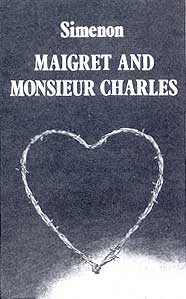 I’ve been thinking about something that I posted last week apropos of my decision to start reading my way through George Simenon’s seventy-five Maigret novels in the order of their writing:
I’ve been thinking about something that I posted last week apropos of my decision to start reading my way through George Simenon’s seventy-five Maigret novels in the order of their writing:
Why, then, haven’t I read more Maigret novels? In part because there are so many of them, making it hard to know where to dive in—but also because they’ve been reprinted virtually at random over the years. Because I have an orderly mind, I’m reflexively disinclined to fish at random in so monstrously large an oeuvre. I like to know where to start, and I like, when possible, to begin at the beginning and proceed from there.
I’ve now read the first four, and another point occurred to me somewhere along the way. When you start exploring so large an oeuvre at random, you never know where you are in your journey to the end of the shelf. While I read primarily—exclusively, insofar as possible—for pleasure, I do like to feel, illusory though the sensation may be, that I’m getting somewhere. When I started reading Trollope, I began, as do most people, with the Palliser novels, about which I knew at the time only that there were six of them and that they formed a sequence that is far easier to understand when read in order. Hence that was what I set out to do, and by the time I got to The Duke’s Children, I knew I was almost finished. That’s my idea of the idea of progress.
The Maigret novels, of course, don’t work that way. Unlike, say, P.G. Wodehouse’s novels about Jeeves and Bertie Wooster, which can easily be read out of sequence but do nevertheless progress (in a manner of speaking) from volume to volume, they are separate and independent entities, free-standing stories that have nothing in common save for the continuing presence of Inspector Maigret. On the other hand, they were written and published over a very long period of time—from 1931 to 1972—and presumably Simenon’s style evolved throughout that period. Or maybe not: I simply don’t know. But I will know if I read them in order, and because I’m a critic with an orderly mind, I’m going to do just that.
 And does it matter? Perhaps not. Probably not, truth to tell. It may be that the only thing besides pleasure that I’ll get out of making my systematic way through Maigret’s adventures is the knowledge of how many more of them I have left to read. Well, that’s fifteen down and sixty to go, I’ll be able to say at some indeterminate point in the future (assuming that I live that long and don’t give up between now and then).
And does it matter? Perhaps not. Probably not, truth to tell. It may be that the only thing besides pleasure that I’ll get out of making my systematic way through Maigret’s adventures is the knowledge of how many more of them I have left to read. Well, that’s fifteen down and sixty to go, I’ll be able to say at some indeterminate point in the future (assuming that I live that long and don’t give up between now and then).
In short, I’ll know where I am—and I hasten to admit that this particular piece of knowledge is almost certainly a meaningless consideration, mere obeisance to one of my psychic quirks. Life itself, after all, is a confused and confusing business, and the older I get, the more inclined I am to agree that (in the words of my favorite song from The 25th Annual Putnam County Spelling Bee) Life is random and unfair/That’s the reason we despair/Life is pandemonium! This disagreeable reality, I suspect, is part of the reason why it matters to me to know that I have seventy-one more Maigret novels to read before I run out of new ones and must start afresh—or, even better, try something new.
Truth to tell, it probably also explains why so many of us are so strongly disposed by nature to expend so much energy establishing other, comparably trivial reigns of order. Whether it’s a meticulously catalogued stamp collection, a fanatically tidy living room, or a never-to-be-altered ritual breakfast menu, we can point to the results and assure ourselves that while we may not have much control over the world, at least we have that much.
A tiny victory? Well, it’s better than nothing. Slightly better, anyway.
